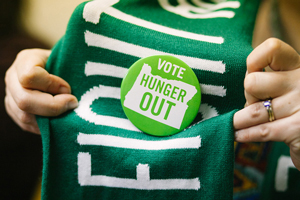Repealing sanctuary law will increase hunger – By David Sarasohn
Repealing sanctuary law will increase hunger – By David Sarasohn
Oregon Food Bank speaks out in opposition to Measure 105
September 18, 2018 – Long ago, in 1987, Oregon became the first sanctuary state, the first state to declare that state and local resources would not be used to enforce federal immigration laws – that local police should not make any different-looking person they encountered show that he was in this country legally.
The bill was introduced by Rocky Barilla, the first Hispanic elected to the Oregon Legislature. Immigration was a hot issue, with several painful recent incidents, in a state with a long checkered history of racial problems.
But somehow, on sanctuary for undocumented immigrants holding up the economy of Oregon, a closely divided legislature had no question.
The Oregon House endorsed sanctuary 58-1. The Senate passed it 29-1.
“We’re not going to hassle people,” explained Dick Springer, sanctuary’s Senate sponsor, “that want to make a living and are contributing to our economy.”
This November, in another critical moment on immigration, Oregon voters are asked to pass Measure 105, erasing the nation’s oldest sanctuary policy.
Oregon Food Bank, committed not to hassling people but to feeding them, says “No.”
 Its opposition will be clear in the Voter’s Pamphlet, standing with other organizations that battle the effects of poverty. The issue may not seem directly related to hunger, although Oregon Food Bank and the food pantries it supplies never ask where their clients come from. The food bank prints its information materials in 13 different languages, and it offers food to Oregonians who speak all of them and more.
Its opposition will be clear in the Voter’s Pamphlet, standing with other organizations that battle the effects of poverty. The issue may not seem directly related to hunger, although Oregon Food Bank and the food pantries it supplies never ask where their clients come from. The food bank prints its information materials in 13 different languages, and it offers food to Oregonians who speak all of them and more.
But the connection may be even more direct. People who fear that any encounter may lead to deportation tend to avoid any public encounter, no matter how hungry their children get.
“When people are afraid to access services, they will not,” points out Rut Martinez-Alicea, Oregon Food Bank’s new Director of Equity, People and Culture. “The more systematic challenges there are to access services, the greater the need.”
Which is pretty much the opposite of the goals of the food bank.
Its slogan, after all, takes on not only hunger but “the root causes of hunger,” and the argument is actually even simpler than that.
“When people face hunger, we feel the charge to stand with them,” says Martinez-Alicea. “We are committed to the individuals we serve.”
The rising fear, and hunger, among immigrants has become very clear, very quickly. The Trump administration has warned that even legal immigrants who use services they’re entitled to, including nutrition programs such as the Supplemental Nutrition Assistance Program or SNAP (formerly known as food stamps) and the Women, Infants and Children (WIC) program, may have their use held against them when they apply for citizenship or green cards. Politico.com, the web site that closely monitors D.C. developments, has reported waves of immigrants asking to be taken off the rolls of both programs.
It’s the kind of development that resounds immediately at food pantries – unless people are afraid to go to them.
Politicians have suggested that undocumented immigrants should be pressured to “self-deport.” No one has suggested, at least not up until now, that they should be starved out.
State and local officials cannot, of course, interfere with federal agents, and agencies like Immigration and Customs Enforcement have expanded arrests and deportations in Oregon and across the nation. But state and local governments in many parts of the country, especially on the West Coast, have passed sanctuary laws to prevent local law enforcement from asking about immigration status and notifying federal agencies about the answers, or alerting immigration authorities when undocumented immigrants are released from local custody.
Many officials point out that connecting local police to immigration authorities makes immigrants less willing to contact police when they are victims or witnesses of a crime, or endangered by domestic violence.
“As we see it, Measure 105 would encourage de facto racial profiling, impacting communities of color and long established immigrant communities in Oregon,” says Martinez-Alicea. “It would reinforce historic inequities among marginalized communities who already experience high food insecurity rates.”
And that, believes Oregon Food Bank, will result in a lot more people going hungry.
